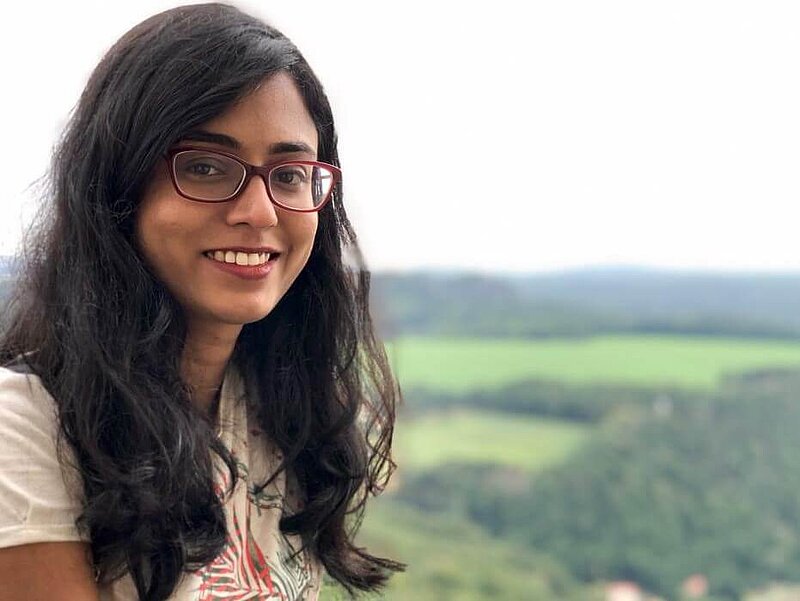
Meet a first-year MPP student and the 2020 recipient of the Sustainability and Energy Policy Scholarship.
Ellipse Rath is a first-year Master of Public Policy student from India and the 2020 recipient of the Sustainability and Energy Policy Scholarship. Having recently arrived in Germany after starting the semester remotely, Ellipse shared her perspective in a short interview with us.
What were you doing before starting your studies this fall?
Before joining the MPP programme, I worked as a consultant at PwC India in their Economic Advisory Services unit. At PwC, I worked with well-known national and international clients on some interesting projects in the field of Economics and Public Policy. Prior to PwC, I also briefly worked with the Tax Policy Research Unit of the Indian Ministry of Finance, and with the financial services start-up FinTown in India.
Why did you choose the MPP programme?
I chose the Master of Public Policy Programme at the Hertie School to learn more about policymaking in the European Union, especially in the renewable energy domain, and to expand my current skill set to work with the European Commission, UN or World Bank Group. The MPP programme at the Hertie School made complete sense to me because I was already into public sector consulting at PwC and had also worked with the Indian Ministry of Finance. Since I had mostly worked with developing countries such as India and Bangladesh, I also wanted to expand my horizons and familiarise myself with EU policy making to advance my career in this field.
Which MPP concentration will you choose and why?
I will be choosing the Policy Analysis concentration to develop my analytical skills. A solid foundation in statistics and programming languages is an essential skill to have in many jobs. Also, from my experience at the organisations I have worked for, I have seen that it is crucial for a public manager to be technically sound. So, I would focus on learning different qualitative and quantitative techniques during the MPP programme. Choosing the policy analysis track also means that I get some more time to improve my German language skills before I take on any managerial or client-facing roles in Germany.
What motivates you about sustainability and energy policy, and in what ways do you plan to pursue these interests during your master’s – and afterwards?
Well, the largest share of emissions comes from the energy sector through its fossil fuel emissions. So, if someone says that they are concerned about the climate crisis, I believe they should also be concerned with how the current energy policies affect climate. In the case of India, it faces many challenges in its current energy policies that need to be overcome for a sustainable future – be it solving the financial and infrastructure challenges of transitioning to renewable energy, developing an effective institutional framework for energy governance, or finding low-cost innovative solutions for energy-efficiency issues. I would like to address one of these issues in my master’s thesis and apply my learnings from Hertie to the Indian context. Also, I plan to opt for courses such as Advanced Climate Policy, Renewable Energy Policies and Multi-Level Climate Governance to enhance my knowledge during the next two years. After graduating from Hertie, I aim to work for the EC, UN or World Bank Group in the climate and energy space, but will also be open to opportunities to work with other organisations involved in the renewable energy sector.
You arrived in Germany not too long ago, after some visa and travel delays caused by the pandemic. What advice would you give to prospective students who want to pursue their master’s degrees in spite of the uncertainties we’re all facing today?
I had to wait for almost six months to get my visa. Every day was stressful and felt like a challenge. However, I have been optimistic about the hybrid mode of teaching from the very beginning. I understand that prospective students may be apprehensive of an online experience or sceptical about losing out on networking possibilities or interacting with fellow students. However, both my work from home experience at my previous organisation and the current online experience at the Hertie School have made me realise that technology has made everything possible. From having loads of events in the Virtual Welcome Week to having professional networking events on MS Teams, or from participating in fully interactive classes on ClickMeeting to collaborating with fellow students on Zoom, everything has worked seamlessly so far. Moreover, I feel that we are more connected than ever due to COVID-19! However, I would suggest prospective students to first take care of their physical and mental well-being and seek support whenever necessary. Please go ahead with your plans but be kind to yourself if something does not work out!
What has been the best part of Berlin so far, and do you have any favourite spots in the city already?
The best part of Berlin for me has been the autumn season. Seeing leaves change their colour to green, yellow, orange and brown was fascinating for me! Just looking at the trees outside my window every morning fills me with so much joy. Also, I am really happy with the air quality in Berlin, compared to that of New Delhi (one of the most polluted cities in the world). I do not really have a favourite spot yet in Berlin, but I enjoy walking along the Spree and in parks, especially in the Humboldthain.
Applicants to the Master of Public Policy and Master of International Affairs programmes can apply for the Sustainability and Energy Policy Scholarship by 1 February.
